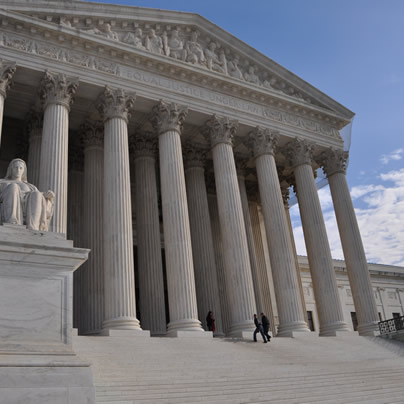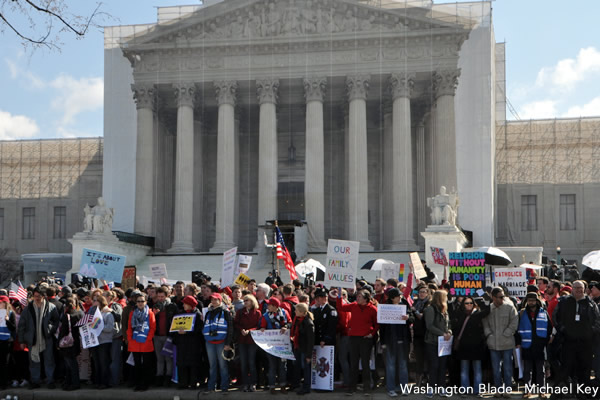National
End of DOMA raises concerns about lingering inequities
Social Security, military benefits could remain problematic after court decision


Issues for married same-sex couples may remain even if the Supreme Court strikes down DOMA. (Washington Blade photo by Michael Key)
While many same-sex couples throughout the country have high hopes that a U.S. Supreme Court ruling striking down the Defense of Marriage Act would mean their marriages would finally have legal status in the eyes of the federal government, certain problems may persist even if the court kills the law.
Depending on the scope of a Supreme Court ruling against Section 3 of DOMA, areas of the law in which couples may continue to face challenges include Social Security benefits — especially if a couple moves to a state that doesn’t recognize their marriages — as well as spousal benefits when one party of the couple is a member of the military, although the immigration issue preventing bi-national couples from staying together in the United States is expected to cease immediately.
Mary Bonauto, civil rights director for Gay & Lesbian Advocates & Defenders, said prior to oral arguments one issue in a post-DOMA world is Social Security benefits if a same-sex couple marries in one state and moves to another where their union isn’t recognized. The survivor benefits given to spouses upon the death of their loved ones is among the more than 1,000 federal benefits withheld from married gay couples under DOMA.
“Say you are married in Massachusetts … and you apply for Social Security in Massachusetts, there would be no doubt with DOMA gone, that your spouse is a spouse for Social Security purposes,” Bonauto said. “However, should you relocate to Florida and apply for Social Security benefits there, it’s more of a problem because Social Security law is going to look at the validity of the marriage at the time you apply for benefits, so your state of residence at the time you apply really matters.”
Bonauto added the aftermath of a ruling striking down DOMA may create “a patchwork” that in some situations would make same-sex marriage dependent on their state validity. Ironing out this patchwork, she said, would take either more litigation, legislation or advocacy within the administration to make changes.
“The overwhelming majority of federal programs don’t specify what state law applies, so it may just be for some situations, a matter of some guidance coming for the agencies that say whether you’re married for a particular benefit,” Bonauto added. “That’s a very practical nuts-and-bolts thing that, you know, we don’t have the luxury of worrying about right now because DOMA is still on the books.”
Susan Silber, a lesbian Takoma Park-based lawyer who specializes in family law for gay couples, said a ruling could affect gay couples differently if the court strikes down DOMA but leaves the constitutional right to marry in the case against California’s Proposition 8 an open question.
“Let’s say a couple was married for 30 years, but because they couldn’t get married until two years ago, it would look technically like they’ve only been married for two years,” Silber said. “But when they’re now dividing up their property, will courts say, ‘Oh you’ve only been married two years, there’s not a lot of marital property to buy?’ or will the court recognize that longer-term relationships deserve some recognition and do some kind of equity based on the non-technical part.”
The Human Rights Campaign didn’t respond to requests for comment on lingering issues for married gay couples.
But the general agreement is that the Respect for Marriage Act, legislation designed to repeal DOMA, would address lingering problems regarding state validity because of the “certainty clause” in the bill. Under that provision, gay couples that legally marry in one jurisdiction would be assured federal benefits even if they move to another state that doesn’t recognize same-sex marriage. The Respect for Marriage Act has yet to be introduced in the 113th Congress.
Sen. Tammy Baldwin (D-Wis.) said during a Blade interview on Monday that she thinks the Respect for Marriage Act could see additional co-sponsors in the wake of so many legislators coming out for marriage equality, but certain bills may have to be rewritten in the aftermath of a court ruling striking DOMA before going forward.
“I think that trend is a very positive one, and, yet, once the Supreme Court in June announces its decision in these two cases, we’re going to have to read those decisions very carefully, understand their reach, impact and then go about the task of looking at their impact on pending legislation,” Baldwin said. “So it may mean that certain things need to be re-written. And that will be a joyous task if we made progress, but we still have a little bit more to go.”
Jon Davidson, legal director or Lambda Legal, was optimistic adjustments could be made, saying the federal government has had to determine previously whether to recognize certain marriages and disputed any notion advanced by DOMA proponents that overturning the law would create a legal mess.
“It’s very important that it be understood that that argument is baseless, as this issue has always existed without creating undue burdens for the federal government,” Davidson said. “For example, some states allow first cousins, or uncles and nieces and aunts and nephews, to marry, and some other states will not allow couples that closely related to marry and will not recognize marriages like those entered in other states as valid for purposes of their own state law.”
Another piece of legislation may be necessary to address the benefits issue for gay service members with same-sex spouses. Sections of U.S. code governing benefits for U.S. service members define marriage as one man, one woman independent of DOMA. Titles 10, 32 and 37 are controlled by DOMA in terms of their definition of marriage, but Title 38, which addresses veterans benefits, defines “spouse” and “surviving spouse” in similar terms and restricts the definitions of persons to the “opposite sex.”
Sen. Jeanne Shaheen (D-N.H.), who sponsors legislation known as Charlie Morgan Act that would afford benefits to gay troops, said in a statement to the Blade that she’s prepared to push forward with the bill in the event that the Supreme Court ruling doesn’t address this issue.
“The Charlie Morgan Act would amend the definition of ‘spouse’ in the federal code in four areas and in turn grant same-sex military couples many benefits that they’ve rightfully earned,” Shaheen said. “Depending on how the Supreme Court rules on DOMA, legislation like this could still be necessary to ensure fairness and equality for all our men and women serving in uniform. Regardless of how the Supreme Court rules, I will continue to work with my colleagues on behalf of our LGBT servicemen and women, and their families, because no one should be denied benefits due to their sexual orientation.”
There may be other difficulties as well. A blog posting Monday from National Public Radio’s Michelle Andrews speculates that married gay couples may have trouble covering their families with company insurance, although many businesses are pre-emptively addressing the issue.
“If a same-sex couple both lives and works in the District there may not be insurance difficulties,” Andrews writes. “But what if one of them works in Virginia, where same-sex marriage isn’t recognized? If a Virginia-based employer doesn’t voluntarily provide benefits to same-sex spouses, the employee might not be able to insure a spouse even though they’re legally married in the state where they live.”
But one issue that’s expected to immediately go away in the inability of gay Americans to sponsor their spouses for residency in the United States via a marriage-based green card application. Each time when asked to address the issue, the Obama administration has cited Section 3 of DOMA — and only Section 3 of DOMA — as the reason why sponsorship of a foreign spouse is unavailable for gay couples.
Lavi Soloway, a gay immigration attorney and founder of The DOMA Project, explained during a conference call last week that gay Americans should be able to sponsor their same-sex couples for residency in the United States immediately after the law is struck down.
“The moment the Defense of Marriage is struck down, green card petitions filed by same-sex married couples can be approved,” Soloway said. “There’s no other barrier; we’ve established that by filing 70 green card petitions over the last three years, we’ve established that with 40 appeals to the Board of Immigration Appeals, we’ve established that with 10 remanded cases from the Board of Immigration Appeals. The government’s position is that the law prevents same-sex couples from access only because of Section 3 of the Defense of Marriage Act. I’ve no expectation that the Obama administration will have any different opinion the day after DOMA is struck down — if that happens.”
U.S. Federal Courts
Federal judge blocks Trump passport executive order
State Department can no longer issue travel documents with ‘X’ gender markers

A federal judge on Friday ruled in favor of a group of transgender and nonbinary people who have filed a lawsuit against President Donald Trump’s executive order that bans the State Department from issuing passports with “X” gender markers.
The Associated Press notes U.S. District Judge Julia Kobick in Boston issued a preliminary injunction against the directive. The American Civil Liberties Union, which represents the plaintiffs, in a press release notes Kobick concluded Trump’s executive order “is likely unconstitutional and in violation of the law.”
“The preliminary injunction requires the State Department to allow six transgender and nonbinary people to obtain passports with sex designations consistent with their gender identity while the lawsuit proceeds,” notes the ACLU. “Though today’s court order applies only to six of the plaintiffs in the case, the plaintiffs plan to quickly file a motion asking the court to certify a class of people affected by the State Department policy and to extend the preliminary injunction to that entire class.”
Former Secretary of State Antony Blinken in June 2021 announced the State Department would begin to issue gender-neutral passports and documents for American citizens who were born overseas.
Dana Zzyym, an intersex U.S. Navy veteran who identifies as nonbinary, in 2015 filed a federal lawsuit against the State Department after it denied their application for a passport with an “X” gender marker. Zzyym in October 2021 received the first gender-neutral American passport.
The State Department policy took effect on April 11, 2022. Trump signed his executive order shortly after he took office in January.
Germany, Denmark, Finland, and the Netherlands are among the countries that have issued travel advisories for trans and nonbinary people who plan to visit the U.S.
“This ruling affirms the inherent dignity of our clients, acknowledging the immediate and profound negative impact that the Trump administration’s passport policy would have on their ability to travel for work, school, and family,” said ACLU of Massachusetts Legal Director Jessie Rossman after Kobick issued her ruling.
“By forcing people to carry documents that directly contradict their identities, the Trump administration is attacking the very foundations of our right to privacy and the freedom to be ourselves,” added Rossman. “We will continue to fight to rescind this unlawful policy for everyone so that no one is placed in this untenable and unsafe position.”
State Department
HIV/AIDS activists protest at State Department, demand full PEPFAR funding restoration
Black coffins placed in front of Harry S. Truman Building

Dozens of HIV/AIDS activists on Thursday gathered in front of the State Department and demanded the Trump-Vance administration fully restore President’s Emergency Plan for AIDS Relief funding.
Housing Works CEO Charles King, Health GAP Executive Director Asia Russell, Human Rights Campaign Senior Public Policy Advocate Matthew Rose, and others placed 206 black Styrofoam coffins in front of the State Department before the protest began.
King said more than an estimated 100,000 people with HIV/AIDS will die this year if PEPFAR funding is not fully restored.
“If we continue to not provide the PEPFAR funding to people living in low-income countries who are living with HIV or at risk, we are going to see millions and millions of deaths as well as millions of new infections,” added King.
Then-President George W. Bush in 2003 signed legislation that created PEPFAR.
The Trump-Vance administration in January froze nearly all U.S. foreign aid spending for at least 90 days. Secretary of State Marco Rubio later issued a waiver that allows the President’s Emergency Plan for AIDS relief and other “life-saving humanitarian assistance” programs to continue to operate during the freeze.
The Washington Blade has previously reported PEPFAR-funded programs in Kenya and other African countries have been forced to suspend services and even shut down because of a lack of U.S. funding. Two South African organizations — OUT LGBT Well-being and Access Chapter 2 — that received PEPFAR funding through the U.S. Agency for International Development and the Centers for Disease Control and Prevention in recent weeks closed down HIV-prevention programs and other services to men who have sex with men.
Rubio last month said 83 percent of USAID contracts have been cancelled. He noted the State Department will administer those that remain in place “more effectively.”
“PEPFAR represents the best of us, the dignity of our country, of our people, of our shared humanity,” said Rose.
Russell described Rubio as “ignorant and incompetent” and said “he should be fired.”
“What secretary of state in 90 days could dismantle what the brilliance of AIDS activism created side-by-side with George W. Bush? What kind of fool could do that? I’ll tell you who, the boss who sits in the Harry S. Truman Building, Marco Rubio,” said Russell.

U.S. Military/Pentagon
Pentagon urged to reverse Naval Academy book ban
Hundreds of titles discussing race, gender, and sexuality pulled from library shelves

Lambda Legal and the Legal Defense Fund issued a letter on Tuesday urging U.S. Defense Secretary Pete Hegseth to reverse course on a policy that led to the removal of 381 books from the Nimitz Library of the U.S. Naval Academy in Annapolis, Md.
Pursuant to President Donald Trump’s executive order 14190, “Ending Radical Indoctrination in K-12 Schooling,” the institution screened 900 titles to identify works promoting “diversity, equity, and inclusion,” removing those that concerned or touched upon “topics pertaining to the experiences of people of color, especially Black people, and/or LGBTQ people,” according to a press release from the civil rights organizations.
These included “I Know Why the Caged Bird Sings” by Maya Angelou, “Stone Fruit” by Lee Lai, “The Hate U Give” by Angie Thomas, “Lies My Teacher Told Me: Everything Your American History Textbook Got Wrong” by James W. Loewen, “Gender Queer: A Memoir” by Maia Kobabe, and “Democracy in Black: How Race Still Enslaves the American Soul” by Eddie S. Glaude, Jr.
The groups further noted that “the collection retained other books with messages and themes that privilege certain races and religions over others, including ‘The Clansman: A Historical Romance of the Ku Klux Klan’ by Thomas Dixon, Jr., ‘Mein Kampf’ by Adolf Hitler, and ‘Heart of Darkness’ by Joseph Conrad.
In their letter, Lambda Legal and LDF argued the books must be returned to circulation to preserve the “constitutional rights” of cadets at the institution, warning of the “danger” that comes with “censoring materials based on viewpoints disfavored by the current administration.”
“Such censorship is especially dangerous in an educational setting, where critical inquiry, intellectual diversity, and exposure to a wide array of perspectives are necessary to educate future citizen-leaders,” Lambda Legal Chief Legal Officer Jennifer C. Pizer and LDF Director of Strategic Initiatives Jin Hee Lee said in the press release.
-

 El Salvador4 days ago
El Salvador4 days agoGay Venezuelan makeup artist remains in El Salvador mega prison
-

 State Department3 days ago
State Department3 days agoHIV/AIDS activists protest at State Department, demand full PEPFAR funding restoration
-

 Brazil3 days ago
Brazil3 days agoUS lists transgender Brazilian congresswoman’s gender as ‘male’ on visa
-

 District of Columbia4 days ago
District of Columbia4 days agoTwo charged with assaulting, robbing gay man at D.C. CVS store











